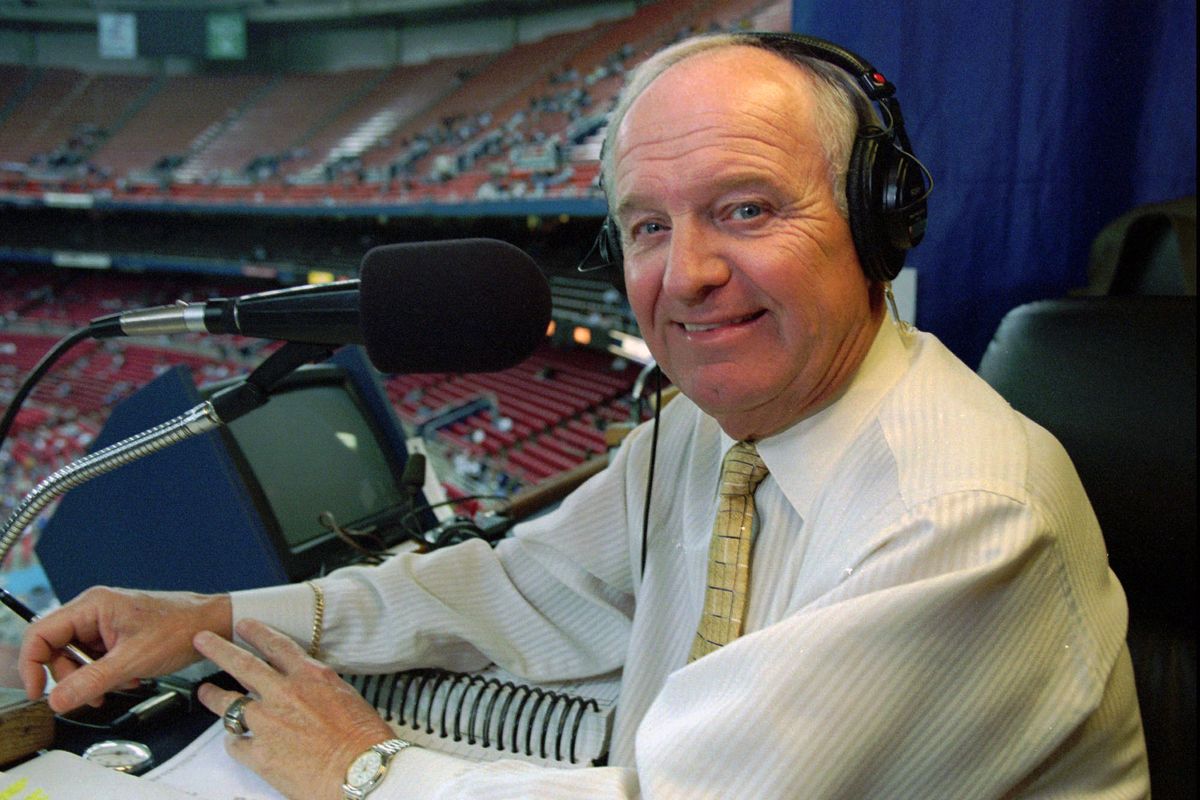Blanchette: M’s only true icon, Niehaus, gave jaded fans hope

Before he began narrating our summer nights, Dave Niehaus was third fiddle to Dick Enberg and Don Drysdale in the broadcast booth of the California Angels, owned by the Singing Cowboy himself, Gene Autry.
“David, you call a hell of a game,” Autry once told Niehaus. “Not the game I’m watching, but a hell of a game.”
Niehaus told that story on himself upon his election to the broadcasters’ wing of the Baseball Hall of Fame two years ago. The occasion called for stories, for humor and humility to leaven the treacly reverence in which the game loves to wallow – but without sacrificing the appreciation and respect due the moment.
And this was Dave Niehaus’ specialty.
Yes, he had his pet catchphrases and made all the signature calls in the history of the Seattle Mariners, a franchise regrettably short on signature moments. But he was also a master of modulation, and not merely in the way he could gear down from an overamped “Swung on and belted!” one batter to a hushed two-Cs-below-middle-C “looooooooooooooowwww” the very next pitch.
That voice, that marvelous instrument, was silenced Wednesday.
Niehaus, the Mariners’ lead play-by-play broadcaster for all 34 years of their existence, died after suffering a heart attack at his Bellevue home, at age 75.
Put away the rye bread and mustard, grandma.
The tributes came flooding in immediately – from club executives, franchise superstars, boothmates, even politicians. But, of course, the most meaningful outpouring came from his regular audience, adoring from almost the first pitch and forever flabbergasted that this otherwise blundering baseball operation could manage to hit a grand salami in hiring – and keeping – this treasure.
The Mariners have had a few Hall of Fame-caliber players – Ken Griffey Jr., Randy Johnson, Edgar Martinez – but they’ve had only one icon, and he never put on a uniform. Indeed, when he threw out the first pitch at Safeco Field in 1999, Niehaus donned a tuxedo.
This was to open The House That Junior Built, you know – Griffey and Johnson and Martinez and the rest having saved the franchise with that implausible run in 1995, with Niehaus providing the soundtrack. But it’s no less true the game chugged along even that long in Seattle because of Niehaus, who somehow made the vaudeville of the Mendoza Line years and Maury Wills fudging on the dimensions of the batter’s box worthy of attention.
Even beyond the pitiful rosters – the M’s were losers in their first 14 seasons of existence – Niehaus had the added burden of carrying his companions in the booth. There have been 22 various sidekicks in all, from woeful Wes Stock to redundant Ron Fairly to Niehaus’ most enduring caddy, Rick Rizzs.
None has captured the imagination, though perhaps they seem lacking because they’ve had to share the microphone with the gold standard.
And yet because Niehaus has maintained such an easy camaraderie with them all, we cut them some slack. It’s pretty much the same way with the ballclub.
If Niehaus found something redeemable about following the Mariners night after night, so could you.
This sort of thing is easily overstated. Because he was sequestered here in the Northwest and because the Mariners have been so unaccomplished, Niehaus’ national reputation was muffled somewhat, at least until his Hall of Fame moment. But in all but a few cases – Vin Scully on the sublime end, Harry Carey on the comic one come to mind – baseball’s radio criers are acquired regional tastes. Even a legend like Ernie Harwell was beloved in Detroit, but his voice was barely recognized in these parts.
Niehaus earned his devotees out here persevering through the hopeless years, and when the ballclub’s first real success brought him a bigger audience, he didn’t let go.
His most famous call – regularly replayed at Safeco 15 years later, and all over the Internet today – was the Martinez double that sent Griffey racing home with run that beat the New York Yankees in the ’95 playoffs.
Maybe you have another favorite. In any case, it was never so much about the poetry he was composing on the fly, but the drama and excitement– or stillness, when called for – he was evoking with his voice.
My memorable moment came in September that year, the M’s trying to stay ahead of the Angels in the standings if only they could get past Oakland on a Sunday afternoon. I listened on a plastic boombox while cleaning out the garage as they fell behind 4-1, then 6-3, then 8-7.
In the ninth, Martinez managed a single off Dennis Eckersley, who then got ahead in the count to Tino Martinez – when the radio’s batteries died.
No matter. Across the alley, a neighbor was tuned in, too – and Niehaus’ voice came roaring over my back fence when Tino took a low fastball over the Kingdome’s fence.
He called a hell of a game that day. It wasn’t the game I was watching – but only because Dave Niehaus was watching for me.